Words of French origin
(Many words from French are used in English)
1. The construction of a mold of a mark, as a footprint, for evidence in a criminal investigation: The police made a moulage of the criminal's car tires that were in the mud at the scene of the burglary of Jake's home.
2. Etymology: from French mouler. "to mold"; from modle, "mold".
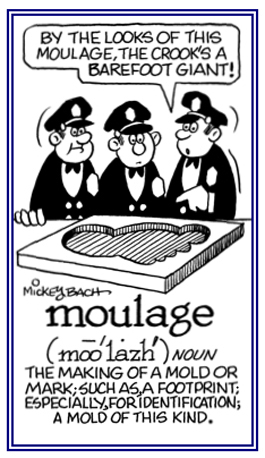
© ALL rights are reserved.
Go to this Word A Day Revisited Index
2. Etymology: from French mouler. "to mold"; from modle, "mold".

Go to this Word A Day Revisited Index
so you can see more of Mickey Bach's cartoons.
1. A dessert or sweet food made of gelatine, whipped cream and a flavouring, such as chocolate, and chilled until stiffened: The caramel mousse at the end of the meal was spectacular.
2. A foamy substance applied to a person's hair to help style and to keep it tidy: The beautician applied mousse to Heather's new cut so that she would continue to look well-groomed.
3. Etymology: from French, foam; from Old French, "moss, foam", partly from Latin mulsa, "honey-sweet".
2. A foamy substance applied to a person's hair to help style and to keep it tidy: The beautician applied mousse to Heather's new cut so that she would continue to look well-groomed.
3. Etymology: from French, foam; from Old French, "moss, foam", partly from Latin mulsa, "honey-sweet".
1. A piece of music for the piano that is lyrical, gentle, evocative of evening or night time: Ms. Lisa performed a nocturne on her keyboard instrument as an entertainment for her friends.
2. Etymology: from Latin nocturnus, "belonging to the night."
2. Etymology: from Latin nocturnus, "belonging to the night."
1. A word commonly used to refer to Christmas, specifically the calendar days between December 24 and January 6: The holiday paper for wrapping gifts was printed with the word noel, spelled out in many colors.
2. Etymology: from Latin natalis, "natal"; from natus, " from nasci, "be born" from Old French noel: from Latin natalis, "having to do with birth".
2. Etymology: from Latin natalis, "natal"; from natus, " from nasci, "be born" from Old French noel: from Latin natalis, "having to do with birth".
1. A part of the standard equipment of a motorized vehicle to indicate the distance traveled: Frank's mother recorded the reading from the odometer which showed how many miles she drove at the end of each day's excursion.
2. Etymology: from French odomètre, from Greek hodometron; from hodos, "journey" + metron, "measure."
2. Etymology: from French odomètre, from Greek hodometron; from hodos, "journey" + metron, "measure."
1. A thin cotton fabric usually used to make curtains or lightweight dresses: Sally Mae wore a bright yellow organdy dress to the Spring Garden Party in the park.
2. Etymology: from French organdi, "fine, thin muslin" or a "light thin cotton cloth used for making dresses, curtains, and sheets".
2. Etymology: from French organdi, "fine, thin muslin" or a "light thin cotton cloth used for making dresses, curtains, and sheets".
parachute (verb), parachutes; parachuted; parachuting
1. To jump or to leap from a flying vehicle while wearing a device designed to retard the progress of the person during the drop towards the earth: On the weekend, Horace would go to the airfield to parachute with his friends who were in the air force.
2. Etymology: from French parachute; from para-, "defense against" + -chute, "a fall."
2. Etymology: from French parachute; from para-, "defense against" + -chute, "a fall."
passé, passe (adjective); more passé, more passe; most passé, most passe
1. Pertaining to being no longer current or in fashion: The kind of musical presentations that were played years ago are now considered to be passé renditions now.
2. Etymology: from the French verb passer, "to pass"; so, it literally means "passed".
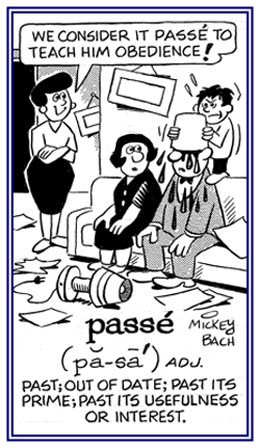
© ALL rights are reserved.
Go to this Word A Day Revisited Index
2. Etymology: from the French verb passer, "to pass"; so, it literally means "passed".

Go to this Word A Day Revisited Index
so you can see more of Mickey Bach's cartoons.
1. A professional or trained care of the feet and toenails so they feel and look good: Maxim was an expert in her field, doing pedicures for her clients, including creaming the toes.
2. Etymology: via French from the Latin roots ped-, “foot” + curare, “to care for.”
2. Etymology: via French from the Latin roots ped-, “foot” + curare, “to care for.”
1. An instrument worn by an individual which records the number of steps taken as a way to measure the distance covered: Toni wore a pedometer on her belt when going for walks so she would know that she was getting lots of healthy, outdoor exercise.
2. Etymology: from French pedometre, "a device for measuring" which was formed from Latin ped-, "foot" + -metre, "meter."
2. Etymology: from French pedometre, "a device for measuring" which was formed from Latin ped-, "foot" + -metre, "meter."
penurious (adjective), more penurious, most penurious
1. A reference to the condition of being miserly or extremely destitute and poor: The old man next door to Tom died a penurious wretch.
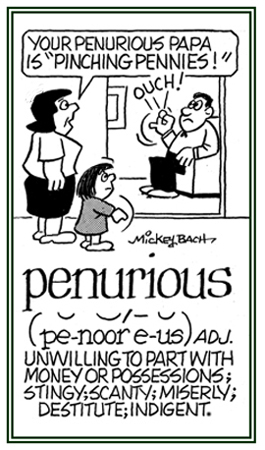
© ALL rights are reserved.
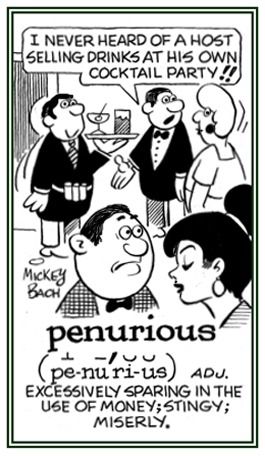
© ALL rights are reserved.
Go to this Word A Day Revisited Index
There are many "street people" in cities who live penurious lives in alleyways, or places without protections from weather conditions, etc.
2. Etymology: from French pénurie or borrowed from Latin penuria, "need, scarcity".

Go to this Word A Day Revisited Index
so you can see more of Mickey Bach's cartoons.
1. An extreme poverty and destitution; dearth, lack, shortage: Morgan was in a state of penury after he lost his job.
2. Etymology: from French pénurie; borrowed from Latin penuria, "want, need".
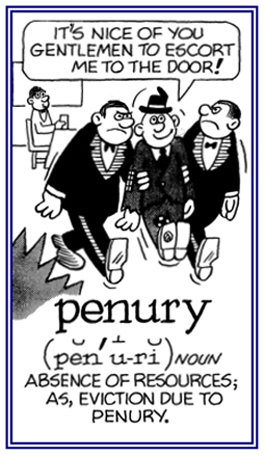
© ALL rights are reserved.
Go to this Word A Day Revisited Index
2. Etymology: from French pénurie; borrowed from Latin penuria, "want, need".

Go to this Word A Day Revisited Index
so you can see more of Mickey Bach's cartoons.
perdu, perdue (adjective) (not comparable)
1. A reference to something or someone that has been hidden, concealed, or lost: Margaret's son has been a perdu child for the last fifteen years since he was stolen from his crib one night by a couple who could not give birth to their own baby.
2. Etymology: Borrowed from French perdue, originally past participle, feminine of perdre, "to lose".

© ALL rights are reserved.
Go to this Word A Day Revisited Index
2. Etymology: Borrowed from French perdue, originally past participle, feminine of perdre, "to lose".

Go to this Word A Day Revisited Index
so you can see more of Mickey Bach's cartoons.
1. A term used for the people or individuals working for an organization or business: The annual report on the personnel at Jim's firm noted that wages were rising slowly over the years.
The business department of an organization that is responsible for hiring, training and placing employees and for setting policies for personnel management.
2. Etymology: from Latin persanalia, from French personal, "people employed in any kind of business, service, or work."
petite (adjective), more petite, most petite
1. A reference to a person or an object that is of small stature or size, little: Ann is a petite woman who is slim and vivacious.
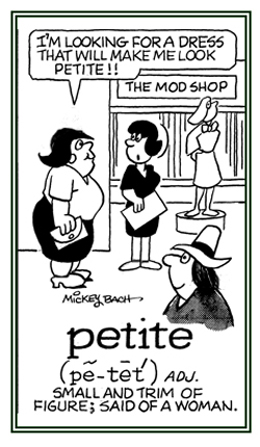
© ALL rights are reserved.
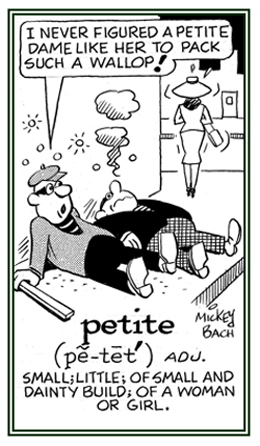
© ALL rights are reserved.
Go to this Word A Day Revisited Index
The clothing store has dresses and other clothing in petite sizes besides those for women who do not have petite bodies.
2. Etymology: from French, petit, "small."



